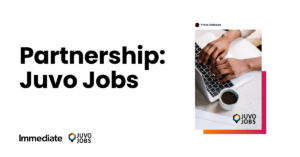High earners now living paycheck-to-paycheck | ImmediatePay

This is a drastic change from just a few years ago when those in the top income bracket were more likely to have savings and live comfortably. What's led to this shift? And what can be done about it?
Share This Post
More To Explore

Press Releases
Juvo Jobs and Immediate Partnership: Boost Hiring with On-Demand Pay
Birmingham, AL – July 24, 2023 – Juvo Jobs, the go-to platform for connecting employers with local job seekers, is thrilled to announce a new
July 23, 2024

Blog
Preserve Credit Health with On-Demand Pay
Empower your employees with Immediate’s on-demand pay solution, helping them safeguard their credit health by facilitating timely bill payments, managing emergencies without accruing debt, and
May 8, 2024
